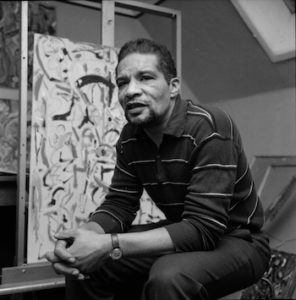
Herbert Gentry
*Herbert Gentry was born on this date in 1919. He was a Black artist and expressionist painter.
Herbert Alexander Gentry was born in Pittsburgh, Pennsylvania. He was the son of James Jentry of Madison Courthouse, Virginia, and Violet Howden of Kingston, Jamaica. By 1924, Gentry was living in Harlem, New York City, with his mother and her family.
The Harlem Renaissance provided the backdrop for Gentry's childhood. His mother worked as a dancer and actress. Under the name Teresa Gentry, she danced in the chorus with Josephine Baker and was in the cast of the original rendition of the Ziegfeld musical Show Boat in 1927 and its revival in 1932. As a youngster, Gentry had a role in the play Scarlet Sister Mary, which toured the country with actress Ethel Barrymore and opened on Broadway in 1931. Gentry took inspiration from artists, musicians, writers, dancers, and actors, all of whom reinforced his belief in the creative world that lay beyond Harlem.
Gentry was educated in the New York City public schools, attending Cooper Junior High and George Washington High School. He pursued drawing in school, took art classes at the Harlem YMCA, and later studied art as part of the Federal Art Project of the WPA (Works Progress Administration) at Roosevelt High School.
He served in the U.S. Army in World War II, taking him to different Mediterranean and Northern European countries: Morocco and Algeria. At the war's end, Gentry was stationed in a Paris suburb. He took every opportunity to visit Paris. Gentry's paintings juxtapose faces and masks, shifting orientations of figures and heads—human and animal—into profiles to the left, to the right, above, and below. The direction of the head, as face or profile, leading right or left, or facing front, is played against the relative scale of each head, its position on the canvas, and its relationship to the others. The faces evoke subtle expressions and moods. Rather than using images to depict a concrete story, Gentry releases his experiences upon the canvas. The act of spontaneous painting uses consciousness itself, and each painting reveals the self.
When asked about direct influences, he avoids imposing external meanings upon primary experience, describing his creative process instead. Romare Bearden (1981) wrote that Gentry's "method is conceptual rather than realistic. One senses in the chromatic emotionalism, and in the biomorphic forms of the figures that often appear in Gentry's paintings, the strong pull of the unconscious." He lived and worked in Paris, France (1946–70; 1976–80), Copenhagen, Denmark (1958–63), in the Swedish cities of Gothenburg (1963–65), Stockholm (1965–76; 2001–03), and Malmö (1980–2001), and in New York City (1970–2000) as a permanent resident of the Hotel Chelsea. Herbert Gentry died on September 8, 2003.
Important retrospective exhibitions since the artist's death include: "Herbert Gentry: Moved by Music," Wadsworth Atheneum, Amistad Center for Art and Culture, Hartford, Connecticut, 2006; "Herbert Gentry: the Man the Magic, the Master," James E. Lewis Museum at Morgan State University in Baltimore, Maryland, 2007; "Herbert Gentry: the Man the Magic, the Master," Diggs Gallery, Winston-Salem State University, North Carolina, 2008; "Herbert Gentry: Facing Other Ways," Rush Rhees Library Rare Books and Special Collections, University of Rochester, Rochester, New York, 2007; "Face to Face," Phillips Museum of Art, Franklin & Marshall College, Lancaster, Pennsylvania, 2005.